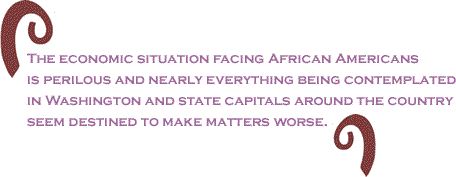| Over
at Jack and Jill Politics, author Jill Tubman took note
of the positive aspects of the country’s employment statistic
for February citing figures from the Grio: “Employers hired
in February at the fastest pace in almost a year and the
unemployment rate fell to 8.9 percent - a nearly two-year
low.” African-American unemployment went down to 15.3 percent
and black youth declined sharply to 38.4 percent, “but remains
the highest of any group,” she wrote. “The good news - some
of your cousins have actually found jobs. Have Ray-Ray,
Boo and Chico finally gotten off your couch?” “So that all
sounds nice, don’t it?” Tubman continued. “Except did you
notice how African-American unemployment is double that
than the average and how 40 percent - close to half! - of
black teens are out of work? Which means Pookie may be staying
in your spare bedroom a mite longer, n’est pas?”
The
bad news, the very perceptive Tubman wrote on the valuable
website, “is that the old saying that when America catches
a cold, Black America gets the flu remains in full effect”
and there is only “a small hope” in the stats. “Where is
the job training and help for college our community needs?
Pell Grants - college financial aid directed at the poorest
of the poor - are targeted for cuts by both the Obama administration
and the Tea Party. Government jobs, traditionally a haven
for African-Americans due to lower barriers to entry, are
on the chopping block as state budgets crash and unions
implode. Will hard-working teachers in inner city schools
be forced to find new ‘service’ jobs serving sandwiches
at Subway?”
Oh,
if only such information and observations were more widely
available. If only the big pundits in the major mass media
saw and expressed thing as clearly. Unfortunately, the alarm
Tubman expresses is – as far as I can tell – mostly restricted
to a handful of African American commentators around the
country, a media outlets big and small. However, what she
write underscores something that should produce wider indignation:
The economic situation facing African Americans is perilous
and nearly everything being contemplated in Washington and
state capitals around the country seem destined to make
matters worse.

Take
these examples:
- Public
Employment
While
the recent decrease in the overall unemployment rate
is good news for some, the massive layoffs being visited
upon states and cities across the country in response
to the ongoing economic crisis is not. This is particularly
true in state and municipalities where public workers
and their unions are under assault. It is also especially
true for African American and other people of color.
Almost
anyone in the African American community is quite aware
of the role of public employment in black economic life.
From early on many of the most secure jobs, those that
had buttressed what some would call the “middle class”
status of black workers, have been in public employment,
be it at the Post Office, the transit system or the
DMV. My first full time job was civil service clerk,
a position from which my hard-working mother retired.
“For
black men, the public sector—everything from police
officers and firefighters to sanitation workers and
government clerks—is the largest employer, providing
18 percent of jobs,” observes Nina Martin of New America
Media “For black women, it’s the No. 2 employer, accounting
for 23.3 percent of jobs. By comparison, the public
sector employs 14.2 percent of white male and 19.8 percent
of white female workers.”
The
attacks on public sector workers will disproportionately
affect blacks and women, researcher Steven Pitts recently
told Martin. African Americans are 30 percent more likely
to have jobs in the public sector, said Pitts, an economist
at the Center for Labor Education and Research at the
University of California, Berkeley. One in five African-American
workers are employed in public sector jobs, as opposed
to one in six white workers and one in ten Latino workers.
“The
assault on public-sector employment could not come at
a worse time for blacks, who have been much harder hit
by job losses—and cuts in the social safety net—than
the workforce as a whole,” said Pitts. He might have
added that because of the hardly-over Great Recession,
the African American community’s total economic worth
declined and public workers layoffs will be still another
hit.
“If
you talk with people engaged with the black community,
you know that the public sector is an important niche
of black employment,” Pitts said. “Despite all the talk
about cutbacks, no one has been talking about how this
would have a disproportionate effect on the black community.”
“A
lot of times, when people think about racial discrimination,
they think about someone in a Klan sheet,” Pitts told
Martin. “It’s important to understand that even if someone
like Scott Walker does not express an overt prejudice
toward blacks, their policies still can have racial
impacts that are unconscious and widespread.”

- Foreclosures
and the Social Safety Net
As
has been documented many times, African Americans, Latinos
and Asian have been hit disproportionately hard by the
home mortgage crisis. That means that the precariousness
of black homeowners increases as the number of instances
grows in which the value of people’s homes becomes less
than the amount of the mortgage, situations referred
to as “underwater.”
Researchers
say that during the last quarter of 2010 about 11.1
million households, or 23.1 percent of all mortgaged
homes, were underwater, up from 22.5 percent, or 10.8
million households, in the previous quarter.
“It's
a tough time for people in minority and immigrant communities
and we see it in our courts every day,” Charles Small,
Chief Clerk for civil matters in the New York State
Supreme Court in Brooklyn told Tony Best of Carib News
this month. “People in the Caribbean immigrant community
who are pursuing the American dream of homeownership
are really feeling it."
“With
unemployment in Black and Hispanic communities hovering
between 13 to 15 percent, Small and other court officials
are reporting a deluge of foreclosure cases, applications
for evictions, judgments for unpaid credit card debts
and efforts by tenants to force their landlords to provide
heat, make repairs or otherwise ensure their properties
are in livable condition,” wrote Best.
According
to Best, in Brooklyn alone, there are about 15,000 foreclosure
cases in the courts or arbitration. "These are
tough times and we see it in the cases for foreclosures,
unpaid debt and landlords who have not been paid the
rents due to them and the tenants who are fighting evictions,"
said a court official in the Bronx. "Minorities
are the hardest hit because they are feeling the brunt
of the unemployment situation."
Meanwhile
in Washington, axe-wielding Republican lawmakers are determined
to slash what meager assistance there is for people caught
in the mortgage crisis.
House
Republicans, led by Rep. Spencer Bachus (R – Alabama), “are
halfway toward their goal of killing four federal programs
meant to prevent home foreclosures,’ wrote Mary Orndorff
of the Birmingham News Sunday. Last week, the body voted,
mostly along partisan lines, to kill the Emergency Mortgage
Relief Program and the FHA Refinance Program in the name
of deficit reduction.
Eight
Democrats voted with the majority while two Republicans
voted against it.
The
House also voted last week to eliminate the FHA Refinance
Program that is aimed to give assistance to people whose
homes have lost significant value. Votes were slated this
week ending the Home Affordable Modification Program and
the Neighborhood Stabilization Program.
These
actions have attracted very little media attention although
they are threats to the livelihoods and survival of millions
of working people. One explanation for this dearth of coverage
will be that the GOP sponsored measures are unlikely to
get past the Senate and there is always the threat of a
Presidential veto. However, in today’s Washington politics
the ever-present scenario is the Republicans pass something
outrageous, the White House negotiates it, and they come
up with a “compromise.”
'The
president and his aides know that the G.O.P. approach to
the budget is wrongheaded and destructive,” New York Times
columnist Paul Krugman wrote March 11. “But they've stopped
making the case for an alternative approach; instead, they've
positioned themselves as know-nothings lite, accepting the
notion that spending must be slashed immediately - just
not as much as Republicans want.
'Mr.
Obama's political advisers clearly believe that this strategy
of protective camouflage offers the president his best chance
at re-election - and they may be right. But that doesn't
change the fact that the White House is aiding and abetting
the dumbing down of our deficit debate.”
Ray
Ray and the others could well end up on the couch more than
a mite longer.
Over
1.2 million young adults moved home with their parents from
2005 to 2010, notes Venessa Wong, a lifestyle and real estate
reporter for Bloomberg Businessweek. The reason? Rents are
soaring.
In
2009, rents fell 5.9 percent: in 2010 they rose 4.2 percent,
compared to an overall consumer prices that climbed only
1.6 percent. Citing figures from the research group AXIOMetrics,
Wong notes that “last year was one of the best periods for
landlords over the past 15 years.”
Furthermore,
“Renter households are unwinding from two- and three-bedroom
units into one-bedroom units after many tenants doubled
up in 2009 to save money,” the researchers told Wong.
Wong
writes that the metropolitan areas with the biggest rent
increases are Greenville, S.C. (11.2 percent), Chattanooga,
Tenn. (10.4 percent), Savannah, Ga., (8.4 percent) and
Portland, Ore. and San Jose, Ca. (close to 8 percent). The
reason for the increasing rent rates is simple: the still
soaring foreclosures are forcing more people onto the rental
market and high unemployment is dissuading workers from
buying homes. Landlords are only doing what landlords have
done throughout recorded history: charging whatever the
market will bear (except in fortunate areas that retain
some form of rent control or stabilization).
Surveying
the scene Tubman wrote, “All for what — to prop up a bloated
military budget and fund a war far away that most Americans
think we should have stopped fighting years ago? We are
wasting our money and bankrupting our future. A mind is
a terrible thing to waste indeed.
“Don’t
get me twisted. I think the economic stimulus probably helped
save the global economy and put off the worst hurt. We have
Obama to thank for that. But while Wall Street has made
a big comeback, it’s been on the backs and at the expense
of those who were fleeced. Black America is picking up the
tab whether it’s on the no job front or the subprime mortgages
we were sold — it ain’t fair and it ain’t right. And we
still look to the Obama administration to help make it right.
Because if our boats rise, so will a lot of other boats.
I, for one, am still a believer yet am still waiting to
see how the Obama administration will make a dent in black
unemployment and ensure stronger futures for us and for
all Americans who have been hit hard during the Great Recession.”
“We
must continue to Hope for Change…
It
springs eternal.

BlackCommentator.com Editorial
Board member Carl Bloice is a writer in San
Francisco, a member of the National Coordinating Committee of the Committees of Correspondence
for Democracy and Socialism and formerly worked
for a healthcare union. Click here to
contact Mr. Bloice.
|

